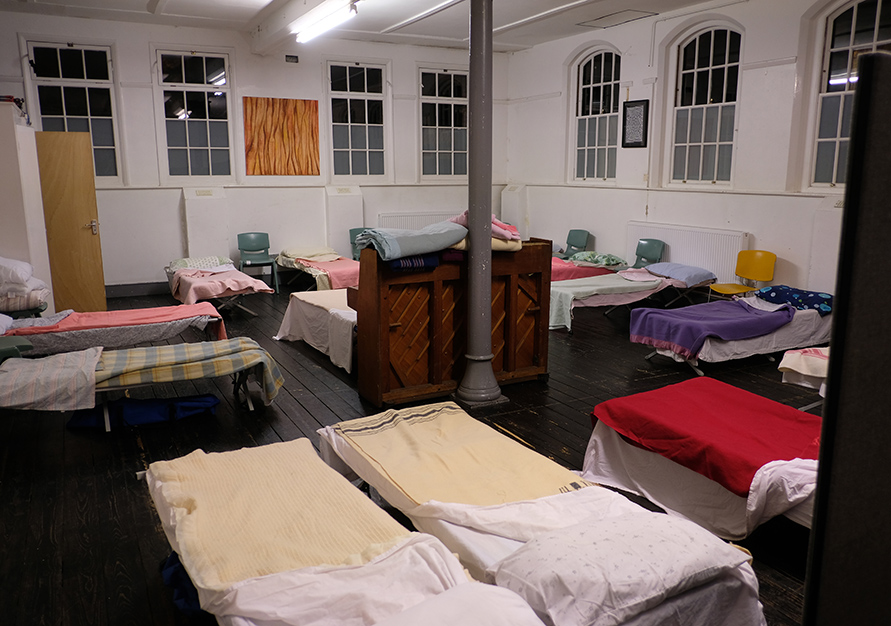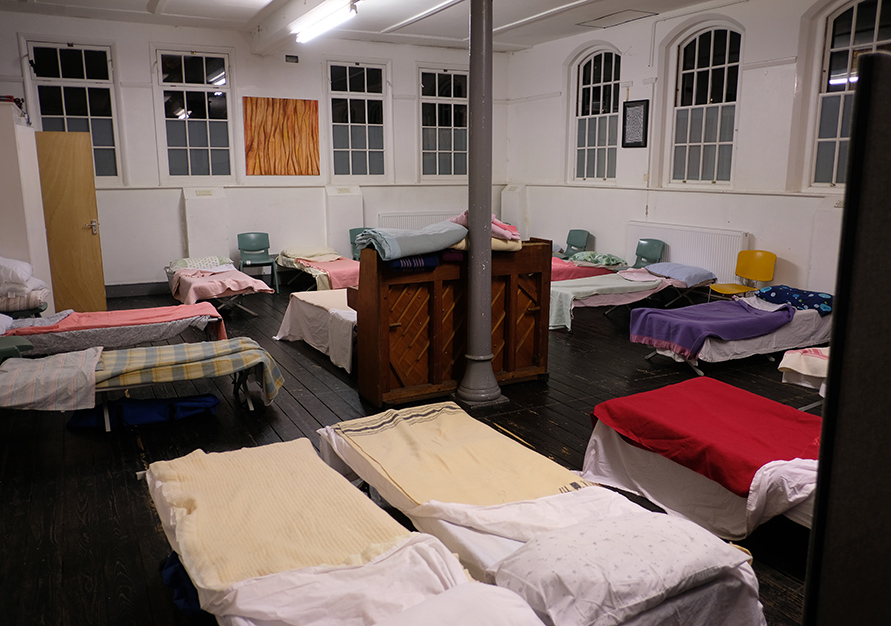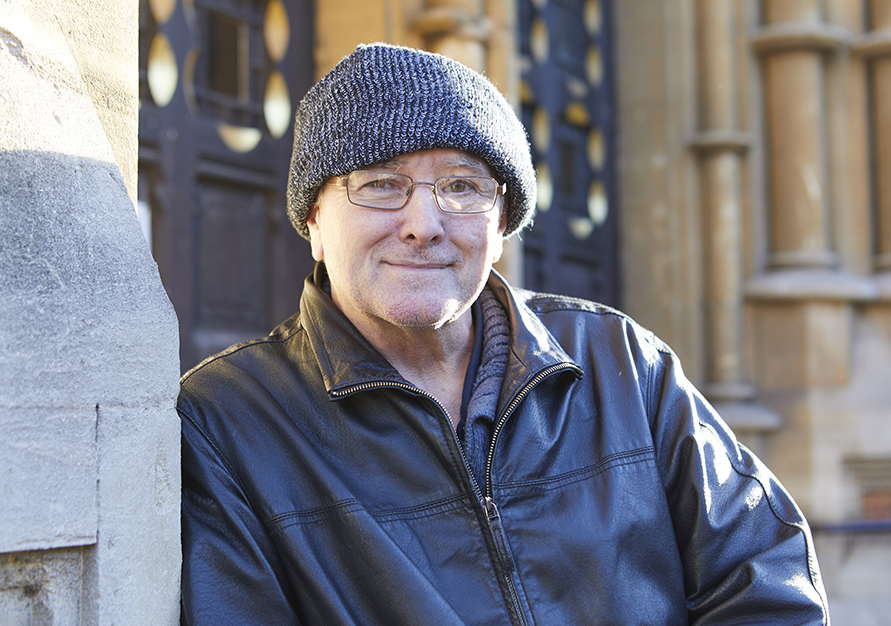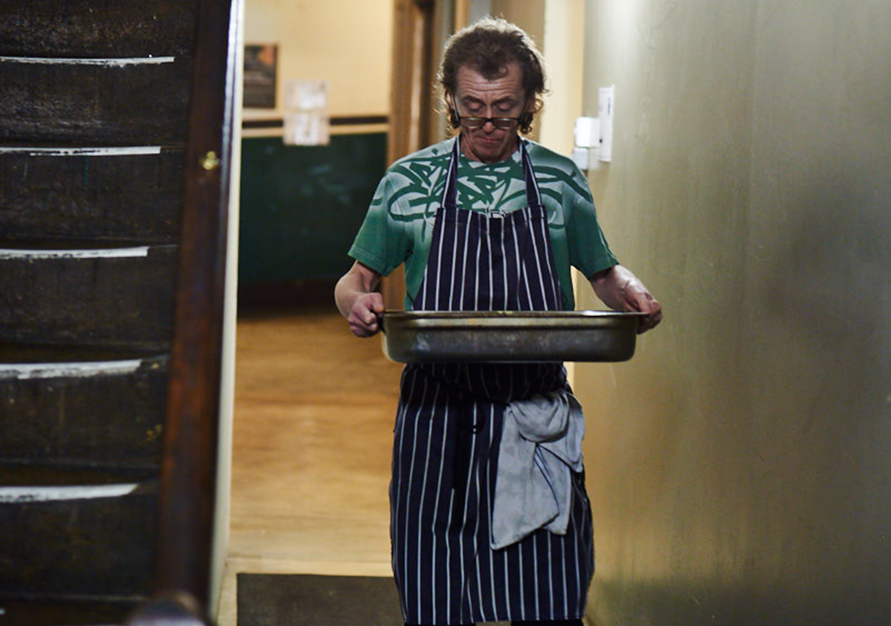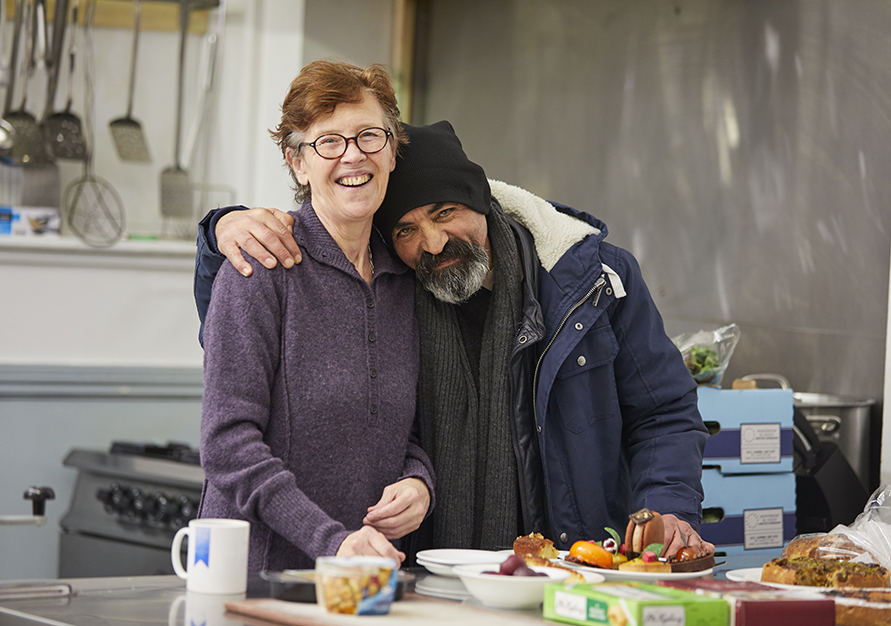We have been supporting the Margins Project by donating the surplus foods & products from our office. At Margins the food is prepared in their own kitchen which also employs and educates those affected by homelessness, so they can gain valuable skills and work experience.
This also reduces food waste, so together we work towards trying to make this planet a better place. We think this is a wonderful initiative and we are very happy to be supporting the Margins project!
The team at Margins have kindly answered several questions of ours explaining who they are, what they do and how you can help out!
How was this charity founded?
Margins was founded in 1992 in response to people coming to Union Chapel in search of food and shelter. It began small and simple, with church members cooking and serving lunch on Sundays. From here, a regular Sunday drop-in was established quickly becoming known as somewhere people could get respite and freshly cooked hot food. As the Sunday project grew and more volunteers got involved, Margins evolved as a secular and independent organisation seeking its own funding, becoming separately constituted in 2013 with its own charity number.
What kinds of support services do you provide to those in need?
Our overriding aim is to support everyone who comes to us to more stable lives longer term. . The Sunday drop-in ran until 2015 – by then we were seeing a weekly average of 147 people for lunch year round and it was impossible to do more than hand food out. The decision to close it followed a considered process of looking at what other local projects were offering and investigating the evolving and varying needs of the people coming to us. By this point we’d started our café training programme as a way of working more closely with smaller numbers – and filling a gap for people struggling to get back on the employment ladder. We took a strategic decision to design a group of interlocking services that built on this approach of close working with manageable numbers and our range of services now span the needs of people struggling with the very basics such as a roof over their head, to employment. With some clients we’ll work across the full span of support on offer – others will engage as needed. A bit more detail will give you a better idea of what I mean….
Our cold weather night shelter runs between January and March, offering vital shelter and hot food to 15 people every Wednesday. We’re part of an Islington seven church network; each church opens one night of the week. Our week day year round drop-ins run on Mondays and Wednesdays and we see up to 20 people per session. We work individually with everyone who comes, on a case work basis with an advice worker who’s on hand to advise on benefits, debt and housing issues. We refer to a number of other agencies and partners for both specialist and non-specialist advice too when needed. Volunteers are essential to both the drop-in service and the night shelter. We’re enormously appreciative of everything they bring to the project. At both shelter and drop-ins, which comprise our crisis services, people have access to showers, clothing, and laundry.
I’ve briefly already mentioned the café training programme. This is our paid employment programme, which continues to go from strength to strength and offers people with experience of homelessness real world work and with it, a chance to break the cycle of long term unemployment. We now employ up to 14 people a year, 12 through the Margins café which cooks for and serves the public at Union Chapel gigs and events and 2 through the office where the focus is on admin. While they’re with us, trainees are supported intensively while they learn new skills and build confidence and self-esteem. At the end of the four months we help them find work outside Margins.
Trainees benefit from our small group and individual ancillary support such as English as a second language, numeracy, job club and therapy. This support is also available to drop-in clients and night shelter guests.
What are some of the struggles you face and how do you overcome them?
People facing homelessness or who are at threat of homelessness frequently have complex needs. We’re a small grassroots project that achieves a lot on a small staff but we’re operating in a broader climate that is extremely harsh for the people who tend to need our services. The severe housing shortage and greatly diminished social housing supply is particularly stark in Islington as the UK’s most densely populated borough. The changes and cuts to welfare (including punitive housing benefit changes) and cuts to statutory funded services, particularly mental ill health, have hit our clientele badly. The job market is insecure. Some people who come to Margins have no recourse to public funds at all. With each and every person who comes seeking help we strive to serve the person and see them by their potential and not their misfortune, doing what we can both practically and emotionally to help give them a voice and get them back on their feet. Homelessness can happen to anyone – the biggest single cause of homelessness currently is the loss of a private tenancy. This now common lack of secure tenancies, loss of work, a lack of money, domestic violence and / or the breakdown of a relationship, mental health issues or substance misuse. These are all reasons commonly cited by our clients as reasons they became homeless. We are here to provide a place to talk, to assist and advocate for our clients, on the phone and in person, to landlords, at the benefits tribunal, at the doctor’s and at the council. A client commented recently that Margins is somewhere with serious people who get stuff done. We do this by fostering positive trusting relationships and offering sustained practical and emotional responses to complex needs. We pride ourselves on a flexible, imaginative and responsive approach and despite the harsh broader context, the people we work with are managing to regain control of their lives.
Are there any specific success stories you would like to share?
We’re very proud of the supported employment programme and this autumn will see its fifth anniversary and start of the 11th cohort of trainees. Since 2016 we have been steadily growing trainee numbers. From 10 people in 2016 we expanded to 12 in 2017. As mentioned, we’ll recruit up to 14 this year. Union Chapel is a great place to be based. It’s a much loved music venue and community hub. The supported employment programme for instance is a great illustration of the way it offers opportunities for dovetailing the work of Margins into the wider life of the organisation.
Every supported employment cohort is different – both age wise and in gender balance. One of the great thing about the programme is that it doesn’t target a particular demographic and our trainees have ranged in age from 19 to 59. It is in the nature of the project that it will be bumpy at times but as we’ve gone along we’ve refined both the shape of the programme and recruitment and our retention and outcomes are extremely gratifying. The 6 trainees who have recently completed the programme have all been placed into work, one moving within Union Chapel into a part time events steward role. Another (who originally came through our drop-in) is employed full time at a large Asda superstore, one is working as a distributor for the Evening Standard, another found a job with Benugo. Our office trainee is hoping to become an Uber driver at the beginning of July having started the training. Our sixth trainee found work as a part time interpreter and is also working as a waitress.
It’s always fantastic when we manage to place one of our clients into housing and see the effect that has on their sense of possibility and the future. This happened with a client who originally came to the shelter and also used the drop-ins. We took him onto the supported training programme when he was still homeless as we could see that his level of commitment and motivation was so high. We then placed him in housing and at the end of the programme secured him work with Pret a Manger. He has been working full time with Pret for over a year. We’ve also recently been able to help a homeless, pregnant drop-in client through use of Islington based Cloudesley’s Welfare Grant. This is a discretionary fund that enables us to help clients with otherwise unaffordable essential items. In this case it funded a mobile phone and maternity clothing. We successfully linked the client into St Mungo’s who have placed her in temporary accommodation and are assessing her case. Another success story is a doctor from Somali who was in our winter shelter. ESOL classes enabled him to sit his exams in the UK so that he can practice here. Finally, I must just mention a trainee, who came with severe anxiety, completely withdrawn and agoraphobic. As with all trainees, we worked closely to establish individual interests and gardening came up. We placed her on a voluntary gardening project where she thrived and was offered employment.
What is the best thing about working for this project?
Making a difference to the lives of the people who need the services and seeing them not need the services any more.
What are some of best ways to help for people or other companies who are interested?
We’re indebted to everyone who supports us – with time, with donations of all kinds and by raising awareness of the project.
Volunteers are always needed for the winter night shelter. Supplies too – toiletries and things like fresh underwear and socks, plus clothes and shoes. While the project is supported generously by a range of funders (Trusts and Foundations, corporate support, local council, community based initiatives and individual donation), money is always extremely welcome as it can be applied exactly where needed.
Donations can be made through their website.


